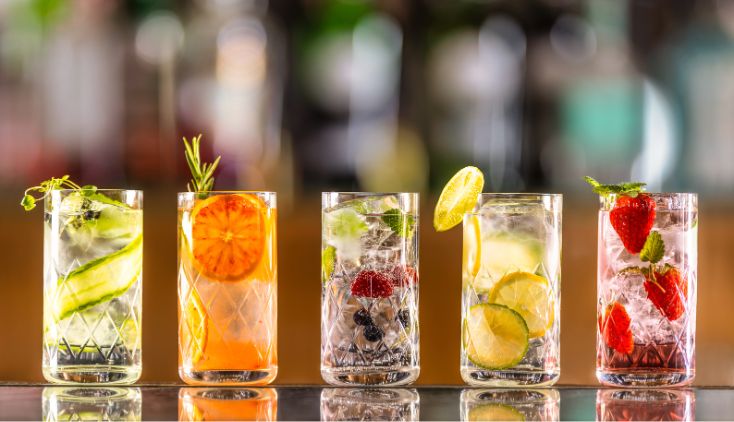Sugary Drinks Should be Avoided
Managing diabetes involves careful attention to diet, particularly when it comes to beverages. Many drinks, especially sugary ones, can cause significant blood sugar spikes making it difficult to maintain proper glucose levels. While it may seem clear that sugary drinks should be avoided, there are several commonly consumed beverages that people with diabetes may not realize are harmful. In this article, we review common drinks for diabetics to avoid.
1. Regular Soda
Soda is one of the worst drinks for diabetics due to its incredibly high sugar content. Even a single can of soda can contain as much as 40 grams of sugar, which can drastically raise blood sugar levels.
- High sugar content: One can of soda often exceeds the daily recommended sugar intake for diabetics.
- Empty calories: Soda offers no nutritional value, contributing to weight gain, which can worsen insulin resistance.
- Rapid blood sugar spikes: The sugar in soda is quickly absorbed into the bloodstream, leading to an immediate rise in blood sugar.
2. Fruit Juices with Added Sugar
While fruit juices may seem like a healthy option, many commercially available juices are loaded with added sugars, making them unsuitable for diabetics.
- High in fructose: Even naturally occurring sugars in fruit juices can raise blood sugar levels quickly.
- Added sugars: Many packaged juices contain added sugars that can significantly contribute to blood glucose spikes.
- Lack of fiber: Unlike whole fruits, juices lack fiber, which is necessary to slow the absorption of sugar into the bloodstream.
3. Sweetened Iced Tea
Sweetened iced teas, like those sold in stores or cafes, often contain large amounts of added sugar, making them a risky choice for diabetics.
- Hidden sugars: Many sweetened iced teas contain over 30 grams of sugar per serving, even if marketed as "lightly sweetened."
- No nutritional benefit: These beverages provide little more than sugar and empty calories, which can negatively affect blood sugar control.
- Dehydration risk: Some iced teas contain caffeine, which can increase urination and lead to dehydration, an issue that can affect blood sugar regulation.
4. Energy Drinks
Energy drinks are particularly problematic for diabetics, as they are often packed with both sugar and caffeine.
- High sugar content: A single energy drink can contain as much as 50 grams of sugar, far exceeding safe limits for diabetics.
- Caffeine overload: The high caffeine content can cause dehydration, making it harder for diabetics to manage blood sugar levels.
- Risk of blood sugar fluctuations: Energy drinks often cause rapid blood sugar spikes followed by crashes, which are dangerous for diabetics.
5. Alcoholic Cocktails
Cocktails, particularly those mixed with sugary syrups, juices or sodas, can be harmful to diabetics.
- High sugar content: Many cocktails like margaritas, daiquiris and piña coladas are loaded with sugar.
- Risk of hypoglycemia: Alcohol can interfere with the liver's ability to regulate blood sugar, increasing the risk of dangerously low blood sugar (hypoglycemia), particularly if consumed on an empty stomach.
- Empty calories: Alcohol provides calories without any nutritional benefits, contributing to weight gain and insulin resistance.
6. Flavored Coffee Drinks
Popular flavored coffee drinks, especially those from major coffee chains, are often high in sugar and fat, making them unsuitable for diabetics.
- Hidden sugars: Drinks like flavored lattes or frappuccinos often contain more than 30 grams of sugar per serving.
- High-calorie content: These beverages are often loaded with cream, syrups and other high-calorie ingredients that can contribute to weight gain.
- Risk of blood sugar spikes: The sugar in these drinks can quickly cause blood sugar levels to rise, making diabetes management difficult.
7. Milkshakes
Milkshakes, though delicious, are among the worst drinks for people with diabetes due to their combination of sugar, fat and calories.
- Extremely high sugar: A standard milkshake can contain upwards of 60 grams of sugar, making it highly detrimental to blood sugar control.
- High-fat content: The fat in milkshakes can slow digestion, which may lead to delayed blood sugar spikes.
- Calorie-dense: Milkshakes are incredibly high in calories, contributing to weight gain and making it harder for diabetics to manage their weight and insulin levels.
8. Sweetened Yogurt Drinks
Yogurt drinks that are pre-sweetened with sugar, often marketed as healthy, can be harmful for diabetics due to their sugar content.
- High in sugar: Many sweetened yogurt drinks contain more than 20 grams of sugar per serving, which can spike blood sugar levels.
- Lack of fiber: While some yogurt drinks provide probiotics, they generally lack fiber to slow down the absorption of sugar.
- Misleading labels: Yogurt drinks marketed as "low-fat" or "healthy" may still contain high levels of sugar, making them unsuitable for diabetics.
9. Pre-Made Smoothies
Store-bought or cafe-prepared smoothies often contain added sugars and syrups, turning a seemingly healthy option into a high-sugar beverage.
- High sugar content: Many pre-made smoothies contain added sugars from syrups, fruit juice concentrates or sweetened yogurt, which can contribute to blood sugar spikes.
- Portion size: Large serving sizes further increase the amount of sugar consumed in a single drink.
- Lack of whole fruits: Smoothies often lack the fiber found in whole fruits, leading to quicker sugar absorption.
10. Canned Fruit Drinks
Canned fruit drinks, though often labeled as containing real fruit, usually have added sugars and are made from concentrates that strip away most of the fruit's natural fiber.
- Loaded with added sugars: Canned fruit drinks typically contain large amounts of added sugar or high-fructose corn syrup.
- Low in nutrients: These drinks are often stripped of the natural nutrients found in whole fruits.
- Quick sugar absorption: The lack of fiber causes the sugar in these drinks to be absorbed rapidly, leading to sharp increases in blood sugar levels.
